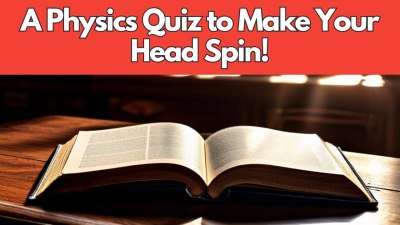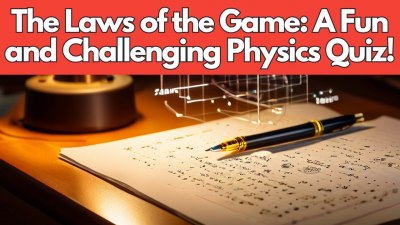The Laws of the Game: A Fun and Challenging Physics Quiz!
This challenge will test your understanding of fundamental physics principles, from mechanics to electromagnetism. Ready to see how well you know the laws that govern our universe? Let’s get started!

This image was created with the assistance of Playground AI
Welcome to the Laws of the Game quiz!
This challenge will test your understanding of fundamental physics principles, from mechanics to electromagnetism. Each question is designed to be both fun and thought-provoking, touching on different areas of physics.
Ready to see how well you know the laws that govern our universe? Let’s get started!
🔬 Question 1: What is Newton's Third Law of Motion?
Force equals mass times acceleration.Energy cannot be created or destroyed, only transferred.An object in motion stays in motion unless acted on by an external force.For every action, there is an equal and opposite reaction.🔬 Question 2: What phenomenon explains why the sky is blue?
Rayleigh scatteringRefractionDoppler effectDiffraction🔬 Question 3: Which principle states that pressure in a fluid decreases as the fluid’s velocity increases?
Archimedes' PrincipleBernoulli's PrinciplePascal's LawBoyle's Law🔬 Question 4: What is the unit of electric current in the International System of Units (SI)?
VoltOhmWattAmpere🔬 Question 5: What law defines the relationship between the voltage, current, and resistance in an electrical circuit?
Ampère's Circuital LawCoulomb's LawFaraday's LawOhm's Law🔬 Question 6: What is the term for the energy possessed by an object due to its motion?
Thermal energyChemical energyPotential energyKinetic energy🔬 Question 7: What principle explains the buoyant force experienced by objects submerged in a fluid?
Pascal's PrincipleArchimedes' PrincipleBernoulli's PrincipleNewton's Third Law🔬 Question 8: What effect describes the change in frequency of a wave in relation to an observer moving relative to the source of the wave?
DiffractionRayleigh ScatteringRedshiftDoppler Effect🔬 Question 9: What is the law of universal gravitation formulated by Isaac Newton?
The pressure of a gas is inversely proportional to its volume when temperature is constant.The change in electric flux through a surface is proportional to the charge enclosed by the surface.The force between two charges is proportional to the product of the charges and inversely proportional to the square of the distance between them.Every mass attracts every other mass with a force proportional to the product of their masses and inversely proportional to the square of the distance between them.🔬 Question 10: Which law states that the entropy of an isolated system never decreases over time?
Third Law of ThermodynamicsZeroth Law of ThermodynamicsSecond Law of ThermodynamicsFirst Law of Thermodynamics🔬 Question 11: Which law describes the electromagnetic force between two charges?
Ampère's LawLenz's LawCoulomb's LawFaraday's Law🔬 Question 12: What is the principle that states that the total momentum of a closed system is constant if no external forces are applied?
Conservation of MomentumConservation of EnergyConservation of ChargeConservation of Mass🔬 Question 13: What law states that the voltage around a closed circuit is equal to the sum of the electromotive forces in that circuit?
Faraday's Law of InductionGauss's LawKirchhoff's Voltage LawKirchhoff's Current Law🔬 Question 14: What principle explains the apparent deflection of moving objects due to Earth's rotation?
Doppler EffectBernoulli's PrincipleArchimedes' PrincipleCoriolis Effect🔬 Question 15: Which equation describes the relationship between the speed of light, wavelength, and frequency of a wave?
𝐹=𝑚𝑎F=ma (Force = Mass × Acceleration)𝐸=𝑚𝑐2E=mc 2 (Energy = Mass × Speed of light squared)𝑐=𝜆𝜈c=λν (Speed of light = Wavelength × Frequency)𝑃=𝐼𝑉P=IV (Power = Current × Voltage) More Like This







































